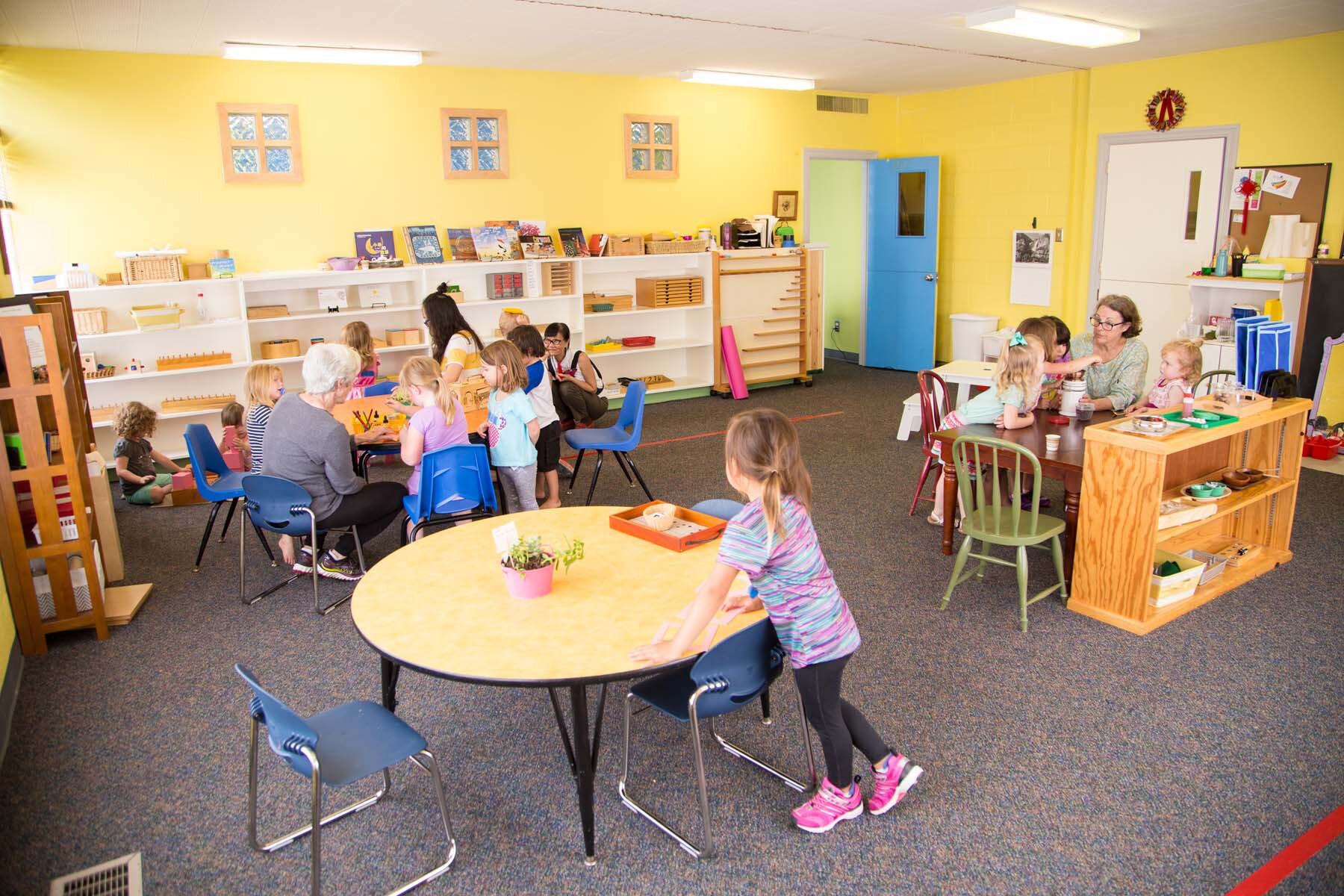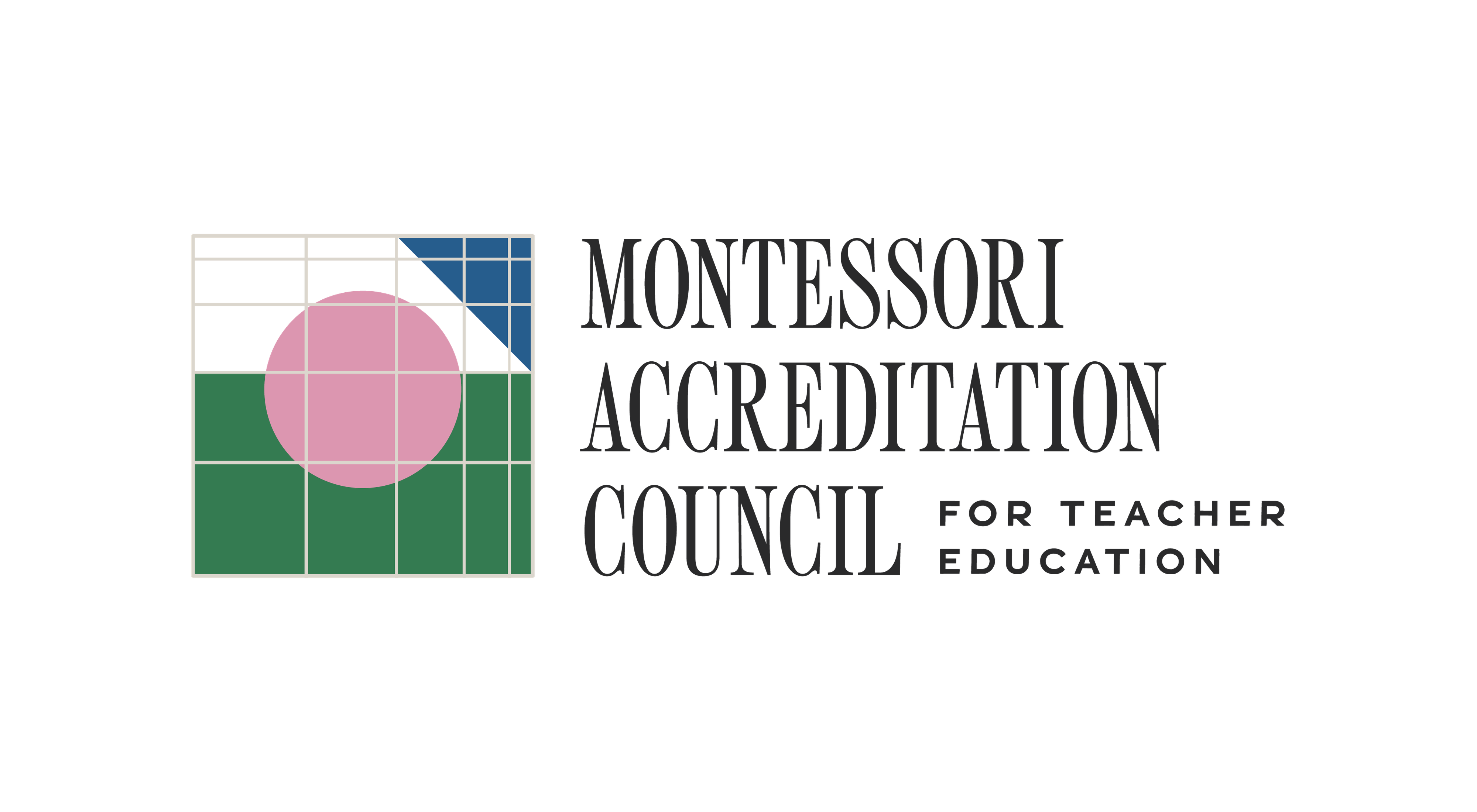

The Ů�������о��� Montessori Teacher Certification Program provides coursework that matches the standards and requirements provided by the American Montessori Society () at the Early Childhood Level. Our program has received full accreditation for it’s Early Childhood level from the Montessori Accreditation Council for Teacher Education () and affiliation with the American Montessori Society ().
What does affiliation and accreditation mean for Montessori training at Ů�������о���? This global recognition strengthens our mission of:
Providing an objective view of the Montessori approach and seeks to place the ideas of Dr. Montessori in the context of contemporary psychological and educational thought. This means questioning and sometimes rejecting peripheral concepts. It also means recognizing that the Montessori approach is an open ended one.
Developing individuals who are experimentally-oriented, scientific pedagogues, in the best sense of Montessori’s term, rather than practitioners of a methodology; individuals who have learned to see the Prepared Environment as a dynamic human ecological system fostering growth in human values as well as in intellectual pursuits.
This program is a Continuing Education program that delves into the Montessori educational method over a two-year time period. The program begins in July with some summer coursework in addition to fall and spring classes.
We are grateful to our Montessori community–past, present, and future–and we are honored to build on the legacy of Montessori education at Ů�������о���, which began over 50 years ago.
For more information about this program, contact the co-directors of the Montessori Teacher Education Program, Jennifer Bush and Charlotte Wood-Wilson, via email at [email protected] or [email protected]. Interested to know more? Join our mailing list !
The Montessori classroom is a prepared environment in which children’s inherent love of learning is encouraged by engaging them in purposeful and meaningful activities. Through their work, children develop concentration and self-discipline. Within this structured and orderly environment, children progress, each at his/her own pace, facilitated by a credentialed Montessori teacher.
Dr. Montessori’s observations of children led her to design multi-sensory, sequential and self-correcting materials. Learning through concrete, hands-on materials provides a firm foundation for later abstract thinking. Multi-age groupings are also a part of the prepared environment. A three-year age span in each class allows learning to occur naturally. More experienced children share what they have learned while reinforcing their own learning.
The Montessori Method is based on a deep respect for children and a thorough understanding of child development. The primary goal of a Montessori education is to help each child reach his/her full potential in all areas of life.
Want to learn more?
Famous Montessori Graduates:
Bill Gates
Julia Child
Anne Frank
Jeff Bezos
Founders of Google (Larry Page and Sergey Brin)
Taylor Swift
Beyonce
Stephen Curry
… just to name a few!
Year One
Summer 1 (week-long intensives):
Montessori Philosophy Part 1 (2 days)
Practical Life (4 full days)
Fall 1 (Saturdays):
Montessori Philosophy Part 2 (6 Saturdays)
Sensorial (8 Saturdays)
Spring 1 (Saturdays):
Math (8 Saturdays)
Child Development (8 Saturdays)
Year Two
Summer 2 (week-long intensives):
Language (5 full days)
Cultural (2 full days)
Fall 2 (evening classes):
���Գٱ���Բ���*✢&�Բ�����;
Practicum and Project Planning I (weekly)*
Seminar I (3 days)*
Spring 2 (evening classes):
���Գٱ���Բ���*✢&�Բ�����;
Practicum and Project Planning II (weekly)*
Seminar II (3 days)*
*must have passed all courses offered in Summer 1, Fall 1 and Spring 1 to attend*
✢for those students wishing to pursue an AMS Early Childhood Credential, they must complete all courses in addition to a ½ day internship, 5 days a week in a Montessori 3-6 classroom for 9.5 months✢&�Բ�����;
Cost
There is a $75 non-refundable registration fee due with application.
Cost to complete all requirements for the Montessori Studies Certificate is $5,850.
Additional fees are associated with pursuing an AMS Credential along with the Montessori Studies Certificate. These fees include:
Adult Learner Fees which are paid to and set by MACTE and AMS, our governing bodies
Montessori Examiner Fees
Students will be notified of the final amounts prior to their internship.
These additional fees usually end up about $800
Ů�������о��� Montessori Manuals for all content areas are covered in the program's cost.
TextBooks and supplies are to be purchased by the student. The total cost for all textbooks and supplies is approximately $200.
All fees and costs are subject to change without notice.
Montessori Philosophy Part 1
Montessori’s View of the Child and the Prepared Environment
Montessori Materials, Philosophy of Teaching, and Goals
Practical Life
Care of the Person 1
Care of the Person 2
Care of Environment 1
Care of Environment 2
Care of the Environment 3
Grace and Courtesy 1
Grace and Courtesy 2
Course Review and Assessment
Montessori Philosophy Part 2
The Prepared Environment
Periods of Development
Freedom/Normalization/Discipline
Montessori in the Classroom
Social Emotional Perspectives
Montessori and Constructivism
Sensorial
Characteristics of the Pre-Operational Child
Model Exercise Format
Philosophy of Sensory Education
Development of the Senses
Practice with Montessori Materials
Sensorial Exercises
Sensorial Presentations
Course Review and Assessment
Math
PreNumber: Logical Classification
PreNumber: Logical Quantification
Introducing 1-10
Introducing Teens
Linear Counting Beyond 10
Using the Golden Beads: Decimal System
Using the Golden Beads: Operations and Math Facts
Course Review and Assessment
Child Development & Advocacy
Infant and Toddler Development
Child Development (3-6)
Child Development Theorists
Assessment of Young Children
Case Study Development
Assessment of the Environment
Advocating for Young Children
Case Study Conferences/Review
Language
Children’s Literature and Conducting Line Times
Pre-Reading and Pre-Writing
Theories of Language Development
Primary Phonics Sequence
Invented Spelling
Writing Before Reading
Classroom Management
Learning Differences in Language
Montessori’s Own Language Materials
Course Review and Assessment
Cultural
Geography
Science - Biological Science
Science - Physical Science
History
Classroom Internship* Aug-Dec half-day, hours TBD by supporting school
Practicum and Project Planning I
Beginning your Internship
Introduction to Observation
Bias and Observation
Inclusivity and Holidays in the Classroom
When Is It a True Choice? When Is It an Expectation?
Preparing and Leading Parent/Teacher Conferences
Note Taking Styles
Course Review and Assessment
Fall Seminar I
Integrating Art in the Classroom
Cultural Revisited
Music
Classroom Management Panel
Classroom Internship* Jan-May half-day, hours TBD by supporting school
Practicum and Project Planning II
Introducing Your Project in the Classroom
Observational Styles: Running Record and Time Sample
Observational Styles: Event Sample and Behavior Sample
Recognizing Learning Differences and How to Address Them
Preparing Children to Move Up or Move On
Wrapping Up the Intern Project
Preparing for the Summer Break
Course Review and Assessment
Spring Seminar II
Classroom Management
Revisiting Language
Revisiting Math
Peace Education
*for those students wishing to pursue an AMS Early Childhood Credential, they must complete all courses in addition to a ½ day internship, 5 days a week in a Montessori 3-6 classroom for 9.5 months*


